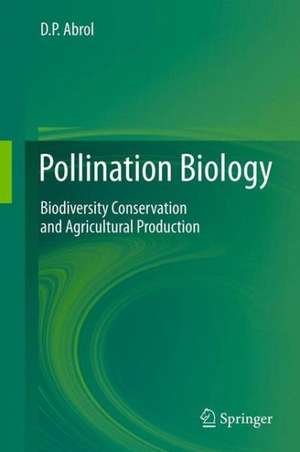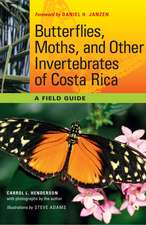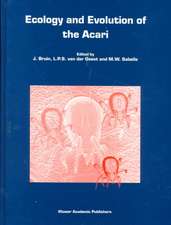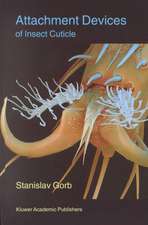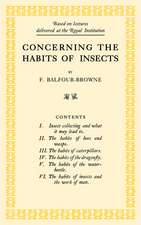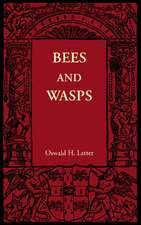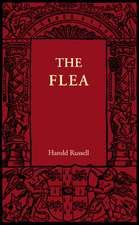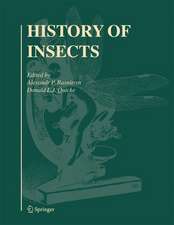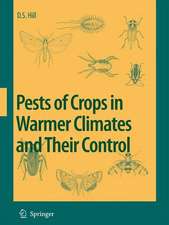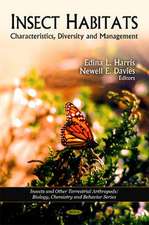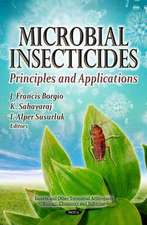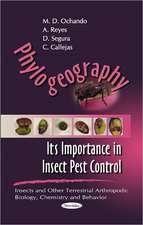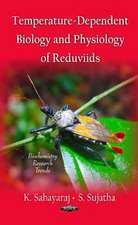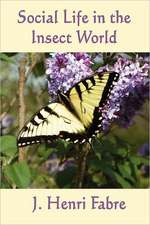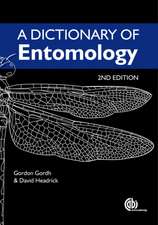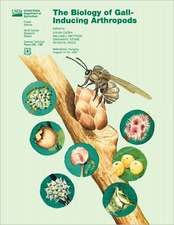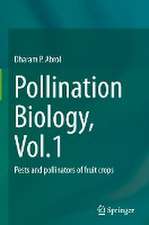Pollination Biology: Biodiversity Conservation and Agricultural Production
Autor Dharam P. Abrolen Limba Engleză Hardback – 5 oct 2011
| Toate formatele și edițiile | Preț | Express |
|---|---|---|
| Paperback (1) | 1076.79 lei 38-44 zile | |
| SPRINGER NETHERLANDS – 23 aug 2016 | 1076.79 lei 38-44 zile | |
| Hardback (1) | 1245.66 lei 6-8 săpt. | |
| SPRINGER NETHERLANDS – 5 oct 2011 | 1245.66 lei 6-8 săpt. |
Preț: 1245.66 lei
Preț vechi: 1519.09 lei
-18% Nou
Puncte Express: 1868
Preț estimativ în valută:
238.43€ • 259.08$ • 200.41£
238.43€ • 259.08$ • 200.41£
Carte tipărită la comandă
Livrare economică 21 aprilie-05 mai
Preluare comenzi: 021 569.72.76
Specificații
ISBN-13: 9789400719415
ISBN-10: 9400719418
Pagini: 450
Ilustrații: XXIX, 792 p.
Dimensiuni: 155 x 235 x 38 mm
Greutate: 1.25 kg
Ediția:2012
Editura: SPRINGER NETHERLANDS
Colecția Springer
Locul publicării:Dordrecht, Netherlands
ISBN-10: 9400719418
Pagini: 450
Ilustrații: XXIX, 792 p.
Dimensiuni: 155 x 235 x 38 mm
Greutate: 1.25 kg
Ediția:2012
Editura: SPRINGER NETHERLANDS
Colecția Springer
Locul publicării:Dordrecht, Netherlands
Public țintă
ResearchCuprins
1. Introduction.- 2. Historical perspective.- 3. Pollination-basic concepts.- 4. Applied pollination- present scenario.- 5. Honeybees and crop pollination.- 6. Wild bees and crop pollination.- 7. Value of bee pollination.- 8. Planned honeybee pollination for crop production.- 9. Non bee pollinators- plant interaction.- 10. Safety of pollinators.- 11. Pollination in cages.- 12. Pollination for hybrid seed production.- 13. Biochemical basis of plant- pollination interaction.- 14. Pollination energetic.- 15. Climate change and pollinators.- 16. Pollinators as bioindicators of ecosystem functioning.- 17. Decline in Pollinators.- 18. The Problem of Diseases in Bees.- 19. Consequences of introduced honeybees upon native bee communities.- 20. Genetically modified plants and bees.- 21. Conservation of pollinators for crop plants and wildlife.- 22. The role of pollination in improving food security and livelihoods.- 23. Capacity building and awareness for pollinators.
Recenzii
From the reviews:
“Abrol … covers the topic encyclopedically and exhaustively, and the book’s timing is important due to the increasing number of observations of declines in pollinator populations (mostly bees) locally and globally. … The author … takes a global view of these problems and provides a multitude of examples and solutions from both the developed and developing world. The book is quite current, broad and balanced in its coverage, and extensively referenced. Summing Up: Highly recommended. Students of all levels, researchers/faculty, and professionals/practitioners.” (W. Loescher, Choice, Vol. 49 (11), July, 2012)
“Abrol … covers the topic encyclopedically and exhaustively, and the book’s timing is important due to the increasing number of observations of declines in pollinator populations (mostly bees) locally and globally. … The author … takes a global view of these problems and provides a multitude of examples and solutions from both the developed and developing world. The book is quite current, broad and balanced in its coverage, and extensively referenced. Summing Up: Highly recommended. Students of all levels, researchers/faculty, and professionals/practitioners.” (W. Loescher, Choice, Vol. 49 (11), July, 2012)
Notă biografică
Dr D P Abrol is a very energetic and dedicated scientist. He did his Ph. D from Haryana Agricultural University Hisar in 1986. After serving this university for some time he joined Division of Entomology Sher-e -Kashmir University of Agricultural Sciences and Technology, Srinagar, India where he served in various capacities as Assistant and then as Associate Professor. Dr Abrol has vast experience and expertise on honeybee management, pollination biology, bee ecology, toxicology, economic entomology and pest management. His research findings have been widely appreciated. His research work has been referred /cited in national and international journals and books. He has chaired several national and international symposia/conferences and delivered lead/guest lectures. He is a member of several scientific societies in India and abroad. He has authored 10 books and published over 200 original research papers, 10 reviews, 10 book chapters and over 64 popular articles on honeybee diseases pollination biology, toxicology and integrated pest management. He is referee of the various national and international Journals and expert in various selection/screening and evaluation committees of scientific bodies /institutions of the country. He has completed several externally funded research projects and has collaborative research projects with international organizations in Poland and Switzerland. He has visited South Korea and several other countries as special invitee to these countries.
Besides receiving letters of appreciation from different organizations, he is recipient of Young Scientist Award - 1992 conferred by the Jammu and Kashmir State Council for Science and Technology -a prestigious State Award for his outstanding contributions in the field of Agricultural Sciences. Besides, he is also recipient of Pran Vohra Award- 1993 - a prestigious Young Scientist Award conferred by Indian Science Congress Association Calcutta for his outstanding andinnovative research in the field of agricultural sciences. He was also conferred Prof. T. N. Ananthakrishnan Award 1997-1998- a prestigious National Award for his outstanding contributions in the field of Entomology by T N Ananthakrisnan Foundation, G .S Gill Research Institute Chennai.Dr. Abrol also won Dr. Rajinder Prasad Puruskar 1999-2000 - a prestigious National Award from Indian Council of Agricultural Research New Delhi for his Hindi book on beekeeping entitled “Madhmakhi Palan- Sidhant Evam Vidhian’’. Dr. Abrol is presently working in Division of Entomology Sher-e -Kashmir university of Agricultural Sciences and Technology, Jammu as Professor and Head and engaged in teaching and research in Entomology which he has been doing over last 25 years.
Besides receiving letters of appreciation from different organizations, he is recipient of Young Scientist Award - 1992 conferred by the Jammu and Kashmir State Council for Science and Technology -a prestigious State Award for his outstanding contributions in the field of Agricultural Sciences. Besides, he is also recipient of Pran Vohra Award- 1993 - a prestigious Young Scientist Award conferred by Indian Science Congress Association Calcutta for his outstanding andinnovative research in the field of agricultural sciences. He was also conferred Prof. T. N. Ananthakrishnan Award 1997-1998- a prestigious National Award for his outstanding contributions in the field of Entomology by T N Ananthakrisnan Foundation, G .S Gill Research Institute Chennai.Dr. Abrol also won Dr. Rajinder Prasad Puruskar 1999-2000 - a prestigious National Award from Indian Council of Agricultural Research New Delhi for his Hindi book on beekeeping entitled “Madhmakhi Palan- Sidhant Evam Vidhian’’. Dr. Abrol is presently working in Division of Entomology Sher-e -Kashmir university of Agricultural Sciences and Technology, Jammu as Professor and Head and engaged in teaching and research in Entomology which he has been doing over last 25 years.
Textul de pe ultima copertă
This book discusses the interplay between pollinators, agriculture, and the environment. The book is an unique blend of pure and applied science placed in the broader human social context. It deals with basic and applied aspects of pollination biology. The chapters on pollination energetics, climate change, pollinator decline, biochemical basis of plant-pollination interaction, pollinators as bioindicators of ecosystem functioning, consequences of introduced honeybees upon native bee communities and capacity building are innovative and provide a base for future insights into pollination biology. The book will be useful to pollination biologists, students, teachers, scientists of agriculture, animal behaviour, botany, conservation, biology, ecology, entomology, environmental biology, forestry, genetics, plant breeding, horticulture, toxicology, zoology, seed growers and seed agencies.
The author is a well known bee scientist, honoured with several national and international awards. He has published over 200 original research papers, authored 10 books and visited Switzerland, Poland, South Korea and several other countries as special invitee.
The author is a well known bee scientist, honoured with several national and international awards. He has published over 200 original research papers, authored 10 books and visited Switzerland, Poland, South Korea and several other countries as special invitee.
Caracteristici
Modern approaches in pollination such as energetics of pollination Biochemical basis of pollination Dangers resulting from pollination crisis
